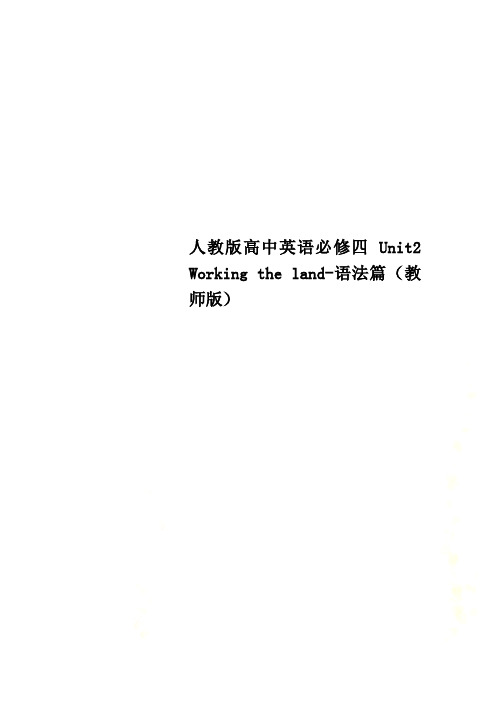高中英语人教版新课标必修四第二单元语法
- 格式:ppt
- 大小:1007.50 KB
- 文档页数:19

人教版高中英语必修四 Unit2 Working the land-语法篇(教师版)Unit2 Working the land语法篇____________________________________________ __________________________________________________________________________________ ______________________________________要求学生掌握本单元的重点语法----动词的-ing形式作主语和宾语并能熟练运用相关语法知识解决相应类型的题。
一、动词的-ing形式由“动词原形+ing形式”构成,它既是现在分词形式,也是动名词形式。
v-ing能在句中作主语、宾语、表语、定语、宾语补足语和状语,但不能单独作谓语。
其时态和语态的变化为主动被动时态语态一般时doing being done完成时having done having beendone二、动词v-ing形式作主语v-ing形式作主语时,通常表示一般的或抽象的多次行为。
克夫人丢了一个袋子。
该句话中每个字母代表了一个动词或短语,这些动词要求后面跟动名词作宾语。
这些动词分别是:M=mind, r=risk, s=succeed in, P=practiceB=be busy, l=look forward to, a=admitC=can't help, k=keep (on), m=missI=insist on, s=suggest, s=stop, e=enjoy, d=delay, a=avoid, b=be worth, a=advise, g=give up2.有些动词既可跟v.ing形式作宾语,也可以跟不定式作宾语,但在语义上却有很大的差别。
go on to do sth.接着又做另一件事go on doing sth.继续做同一件事remember to do sth.记得要去做某事remember doing sth.记得曾做过某事try to do sth.努力做某事try doing sth.尝试做某事regret to do sth.对将要做的事表示遗憾regret doing sth.对做过的事表示后悔mean to do sth.打算/想做某事mean doing sth.意味着做某事3.v.ing形式作介词的宾语。

人教版高中英语必修四Unit2课文全解(常考单词、高频短语和写作句式)Ⅰ. 常考单词必背1.consist vi.组成;在于;一致Learning and personality do not always consist together.学问与人格并不总是相一致的。
[快速闪记]consist of由……组成consist in 在于consist with 与……一致be consistent with与……一致consistent adj.一致的;一贯的;连续的2.clarify vt.澄清;阐明I am happy to clarify any points that are still unclear.我愿意说明任何仍然不清楚的地方。
A bank spokesman was unable to clarify the situation.一位银行发言人未能把情况解释清楚。
3.accomplish vt.完成;达成;实现The explorer accomplished the voyage in three weeks.探险家在三周内完成了这次航行。
[快速闪记]同义词:finish,accomplish,complete,conclude,end4.convenience n.方便;便利Any help from you will be greatly appreciated.Please give me a reply at your earliest convenience.你们所提供的任何帮助我们都很感激,请在方便的时候尽早联系我们。
[快速闪记](1)for convenience为了方便起见at one's convenience 在某人方便的时候convenience food方便食品convenience store便利店(2)convenient adj.便利的;方便的;就近的It is convenient for sb to do sth某人方便做某事if/when it is convenient方便的话/方便的时候5.attract vt.吸引;引起注意Suddenly,a round of applause attracts their attention.突然,一阵掌声吸引了他们的注意力。

Section ⅣGrammar动词-ing形式作主语和宾语1.(教材P10)Since then, finding(find) ways to grow more rice has been his life goal.2.(教材P10)As a young man, he saw the great need for increasing(increase) the rice output.3.(教材P10)Yuan Longping searched for a way to increase rice harvests without expanding(expand) the area of the fields.4.(教材P10)He enjoys listening(listen) to violin music, playing(play) mah-jong, swimming(swim) and reading(read).5.(教材P10)He awoke from his dream with the hope of producing(produce) a kind of rice that could feed more people.6.It is no use arguing(argue) with him about such a matter.一、v.ing形式有时态和语态的变化,其构成见下表(以write为例)主动语态被动语态一般时writing being written完成时having written having been written1.v.ing词所表示的动作之后。
I saw them chatting in the shade of a large tree.我看见他们正在一棵大树的阴凉处闲聊。
(同时)They looked down upon each other,causing a big argument.他们彼此看不起对方,导致激烈的争吵。



必修四第二单元知识和语法讲解人教新课标:必修4 Unit2 单元重点辅导一、日常口语突破建议与应答①—How about going out for a walk after class?下课后出去散步好吗?—I‘d prefer to stay at home because it is raining. 因天下雨,我宁愿呆在家里。
②—Would you rather go to the movie tonight with us?你愿意今晚和我们一起去看电影吗?—I think I‘d better look after my sick father at home. 我想最好还是在家照顾生病的父亲。
二、核心单词例析1. struggle vi. & vt. 努力,拼搏,斗争struggle to do sth (=make great efforts to do sth.)努力做某事…he has struggled for the past five decades to help them.他在过去50年来一直在努力帮助他们。
She struggled to keep back the tears. 她努力忍住泪水。
搭配:struggle for争夺;struggle with /against同……斗争2. equip vi. & vt. 使(某人)具备条件;装备,配备(1)equip sb. for/to do sth.使某人具备做某事的条件,使某人能够做某事Your training will equip you for your future job. 你的训练使得你能够胜任将来的工作。
Your education will equip you to earn a good living. 你受的教育能够使你能谋上好生计。
(2)equip…with…用……装备……He equipped his bike with a head light. 他给自行车装上了前灯。
Module 4 Unit 2 Working the Land 1. If so, what did you do to grow them? If not, what kind of plant would you like to try growing?If so/ if not省略不定式省略,省略不定式标志to。
如果不定式内容为系表结构,保留to be。
主从句主语一致,且从句中有系动词时,从句的主语和系动词都省略。
When waiting in a line, you can start a small talk.When you are waiting in a line, you can start a small talk.If it is so/ not/ possible/ necessary/ important = if so/ not/ possible/ necessary/ important2.More than 800 million people go to bedhungry every day.形容词做状语,修饰主语,表示主语的性质或状态。
做状语的形容词与动词之间构不成修饰关系。
All countries, large or small, are equal. 形容词做让步状语3.Although he is one of China’s most famous scientists, Yuan Longping considers himself a farmer, for he works the land to do his research.Work vt. 耕作经营Consider doingConsider A (as) BConsider A (to be) BConsider v. 盯着看He considers the picture attentively.Stand完全不及物动词be 存在There beCome into being4.His sunburnt face and arms and his slim, strong body are just like those of millions of Chinese farmers, for whom he has struggled for the past five decades.专有名词后多带非限制性定语从句。
Book4 Unit2 Working the land语法:v–ing 形式作主语和宾语Step1:Lead-in 寻规找矩:请找出下面句子中的v–ing form. 并说出分别充当什么成分。
1.Since then, finding ways to grow more rice has been his life goal.2.As a young man ,he saw the great need for increasing the rice output.3.Dr Yuan searched for a way to increase rice harvests without expanding the area of the f ields.4.However, he doesn't care about being famous.5.He enjoys listening to violin music, playing mah-jong, swimming and reading.6.Spending money on himself or leading a comfortable life also means very little to him.7.Just dreaming for things, however, costs nothing.8.Dr Yuan awoke from his dream with the hope of producing a kind of rice that could feed more. Step2:基本特征动名词v-ing1.动词-ing 形式不能单独作谓语, 但可以有自己的宾语和状语, 还有时态和语态的变化。
2.动词-ing 形式由动词加-ing 变化而成, 它同时具有名词和动词的特征, 在句中作主、宾等。
动词ing 形式作主语1.v-ing 置于句首。
高中英语学习材料madeofjingetieji动词--ing形式作主语和宾语动名词是非谓动词的又一种形式。
它在形式上与现在分词相同,都是在动词原形的词末加-ing。
在现代语法中,这两种形式同视为"-ing形式"。
这两种形式的另一个相同之处是:它们都是由动词变化而成的,它们都保留了动词的某些特征,它们都能带自己的宾语、状语,而构成动名词短语或是现在分词短语去担当句子成分。
动名词- 概述动名词是非限定动词的一种形式,由动词原形+ing构成。
它既有动词的特征,又有名词的特征,故称。
动名词也有时态和语态的变化,如表所示(以及物动词write为例),不及物动词没有语态的变化。
时态/语态主动被动一般式 writing being writtenhaving been written完成式havingwritten动名词- 动名词的结构和形式动名词的否定结构动名词的否定结构由not加动名词组成。
如:Trying without success is better than not trying at all.实验没有成功也比不实验好。
He hated himself for not having work hard.他悔恨自己没有用功。
I’m sorry for not having telephoned you before.很抱歉,没有早给你打电话。
He felt sorry for not having done the work well.他为没有把工作做好感到难过。
I fancy it has done you a lot of good not going.我看不去对你倒好了。
(not going 是动名词一般式的否定形式)There is no denying the fact that he is diligent. (no denying 也是动名词一般式的否定)动名词复合结构通常情况下,动名词的逻辑主语为谓语动词的主语。
Unit 2 sporting events 语言点及语法精解词汇honorable adj.可敬的,荣誉的,光荣的ex: Though it is honorable to be a cleaner, many people wouldn,t like to do that 虽然做一个清洁工是受人尊敬的工作,许多却不愿做。
n.敬重,尊敬;被引以为荣的人物,荣誉,名誉;信用All the athletes tried their best to win honor for their motherland 所有的运动员都竭尽全力为祖国争光。
He's an honor to his parents. 他的父母以他为荣。
vt.受到尊敬He was honored for his courage in battle. 他因在战斗中的英勇表现而受到尊敬。
有用句型:in honor of/in one,s honor为纪念,为庆祝;We held a special party in honor of our visitors.我举行了一个特别晚会向我们的来客表示敬意。
相关链接:show honor to对某人表示敬意;have the honor to do 很入荣幸地feel honored to do因做而感到荣幸;on one,s honor以某人的名誉担保games n.game则指有一定规则的,双方竞争的游戏或运动,既可以是体力运动,也可以是脑力劳动,以输赢为主要目的。
而sport指户外游戏或运动,仅限于体力锻炼,包括娱乐性的及竞赛性的;不以胜负为目的。
sports 和games都表示“运动会”,但有大、小之分,如school sports (校运会),the Asian Games (亚运会),the Olympic Games (奥运会)delight n.乐趣;喜悦;欣喜The children were made to laugh with delight 孩子们被逗得高兴地大笑adj. delighted欣喜的,快乐的I was delighted to be invited to her party.我很高兴被邀请参加她的晚会。